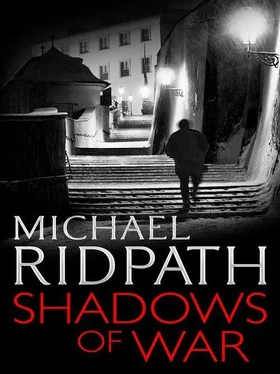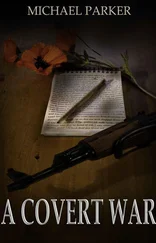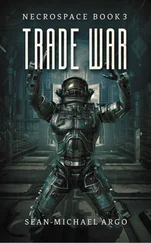That bothered me afterwards, but Gustav said the chief was only angry with me because he had been so shaken by nearly losing me yesterday.
I wonder if that is true. I hope it is.
There is nothing I wouldn’t do for General Guderian.
Liverpool Street Station, London, 4 May 1940
Conrad lit yet another cigarette and watched the steam-smeared iron, steel and blackened brick jolt and judder past the train window. The train was just outside Liverpool Street Station and had been for a quarter of an hour. The journey from Ipswich had taken two hours longer than it should, with an hour spent stationary in Chelmsford, and Conrad had stood all the way.
If the soldiers of the British Army had been trained in one skill during the long phoney war, it was patience. But even with so much practice, Conrad found it hard to maintain his. He couldn’t wait to get to London. He hadn’t been to the capital since November — indeed he had scarcely been away on leave. A couple of days down to Somerset for Millie’s funeral in December, another three days at Christmas. Then nothing.
Part of the reason was that the battalion had been despatched to Galloway in January, shivering on a frozen hillside in one of the coldest winters on record.
The other reason was that Conrad’s CO, Colonel Rydal, had been told by ‘the powers that be’ not to let his lieutenant take leave in London. The colonel never spoke to Conrad about this directly, and Conrad didn’t ask him. Until, one afternoon at the beginning of April, when the colonel summoned Conrad to join him on a recce to plan an exercise for the following week.
They drove up into the hills and then Colonel Rydal consulted his map and set off at a rapid pace up a slope beside a burn, swollen with spring meltwater. There was sunshine, and the snow had almost disappeared from the hills. After half an hour’s strenuous climb, they reached the top of a crag, with a dramatic view to the north of moors and lochs and to the south of a patchwork of fields glistening in the spring sunlight, dotted with barrel-shaped sheep on the brink of giving birth, and the white-belted local cows.
The colonel sat down and pulled out his pipe. Conrad lit a cigarette, and began to examine his map for likely rallying points for the exercise.
‘Sod the exercise, Conrad. I already know what we are going to do.’
Conrad smiled. ‘Very good, sir.’
‘You are a damned good officer, Conrad.’
‘Thank you, sir.’
‘If I ask you something will you give me an honest answer?’
Conrad mulled over the colonel’s question before replying. One of the things he liked about his unit was the trust between the officers. And the men, for that matter. They were all very different — some of them didn’t even like each other — but they trusted one another. And they all trusted Colonel Rydal. He led by example.
‘I won’t give you a dishonest answer,’ said Conrad. ‘I might say I can’t answer the question. Depends what it is, obviously.’
Rydal frowned. ‘I suppose that will have to do.’ He puffed at his pipe. ‘Conrad, are you a Soviet spy?’
‘No, sir,’ said Conrad firmly. But he appreciated the directness of the question.
‘Thought not,’ said Rydal. ‘But there are some people who think you are. You clearly got yourself into some hot water when you were away on Sir Robert Vansittart’s business last autumn.’
‘I did. I discovered some things that some people with power would rather I hadn’t.’
‘I gathered something like that might be going on. Look here, it’s not right you’ve been stuck up here without any leave for so many months. If you give me your word not to cause trouble and ask difficult questions, I’ll grant you some leave. Will you give me your word?’
‘I’m afraid I can’t do that, sir.’
‘Why the devil not?’
Conrad explained. If Rydal trusted him, then he should trust Rydal. He told him about Millie’s murder and about Theo’s allegations that the Duke of Windsor had been indirectly providing information about the French deployment to the Germans.
Colonel Rydal listened, his frown deepening as Conrad’s story progressed. ‘Is this true, de Lancey?’
‘Absolutely true, sir.’
Rydal examined his lieutenant closely. ‘Well, I can see why they want to keep you stuck up here.’
‘So can I, sir.’
‘Leave it with me, de Lancey.’
Two days later Rydal told Conrad he could have seven days’ leave the following week, during which time he could ask all the questions he damn well wanted, but he should ask them as unobtrusively as possible.
But then Germany invaded Norway. All leave was cancelled, and the battalion loaded up on to their lorries and spent several days driving erratically around the north-east of England and Scotland. The general staff couldn’t seem to decide whether a motorized battalion was an asset or a liability in the Norwegian mountains. In the end half the battalion embarked on a ship at Newcastle without their vehicles, and steamed out into the North Sea. They were given maps of the countryside around the small town of Namsos. But they never made it. Within sight of the coast of Norway, the ship was given orders to turn around and steam back to England.
After a further week loitering in the Northumberland countryside, they were sent down to Suffolk to protect East Anglia from a German invasion, and Conrad was finally granted a weekend’s leave.
During his time in Scotland Anneliese had sent him perhaps half a dozen letters. They spoke obliquely about ‘their friends in Kensington’; although Anneliese didn’t mention the Russian Tea Rooms by name, she did mention Constance. It was clear that she was becoming friendly with the woman, but it didn’t sound as if she had learned much of interest. Conrad was very pleased to see her trying so hard to help him, especially dealing with such hateful people, although reading between the lines it was clear that Anneliese enjoyed the cloak-and-dagger aspect of her endeavour. He replied with carefully constructed letters, encouraging her, telling her he was thinking about her but not scaring her off with too much sentiment.
The truth was he was thinking about her. It would be odd if stuck in a frozen hut in Scotland with a group of fellow soldiers he hadn’t thought about the woman he had fallen in love with in Berlin: so spirited, so sensual, so enchanting. He wondered whether the month or so they had spent entwined with each other back then was all that there ever would be. In his more disheartened moments, when it was particularly dark and cold, and the boredom was reaching extremes, he feared that might be the case.
Was it just the old Anneliese he had been in love with? Had the Nazis changed her permanently with their callous brutality, their concentration camps, their murders? They had trampled on her soul, injured it perhaps beyond repair. He knew he could still love her. But could she love him? And if she couldn’t, shouldn’t he just let her go?
Then, just a few days after the invasion of Norway, he had received an excited letter from her saying she had learned some gossip from their Kensington friends that she simply must tell him in person. That was three weeks ago, and it was only now that he had managed to arrange to see her: she had promised to meet him at Liverpool Street Station that afternoon. Conrad hoped she would still be there, despite the lateness of his train. Knowing Anneliese, she wouldn’t give up unless she had to, but then a shift at the hospital might force her.
He was eager to hear what she had to say. Millie’s death was still unresolved. Stuck away in darkest, coldest Scotland without hope of leave, there had been nothing Conrad could do about that, but he could think about it. He was sure that Theo wasn’t responsible, but he had no idea who was, and time did nothing to reduce his need to know. Something was going on, probably something involving Sir Henry Alston, Charles Bedaux and the Duke of Windsor. Conrad could hope that Major McCaigue had made some progress in finding out what, but even if he had, he probably wouldn’t tell Conrad. Conrad’s feelings towards his father were mixed: on the one hand he blamed him for letting Millie go to Holland on such a hare-brained scheme, on the other he felt desperately sorry for him for the loss of his daughter. And Conrad himself wasn’t free of blame. If he had only done what his father had asked and talked to Theo about peace, Millie would still be alive.
Читать дальше












